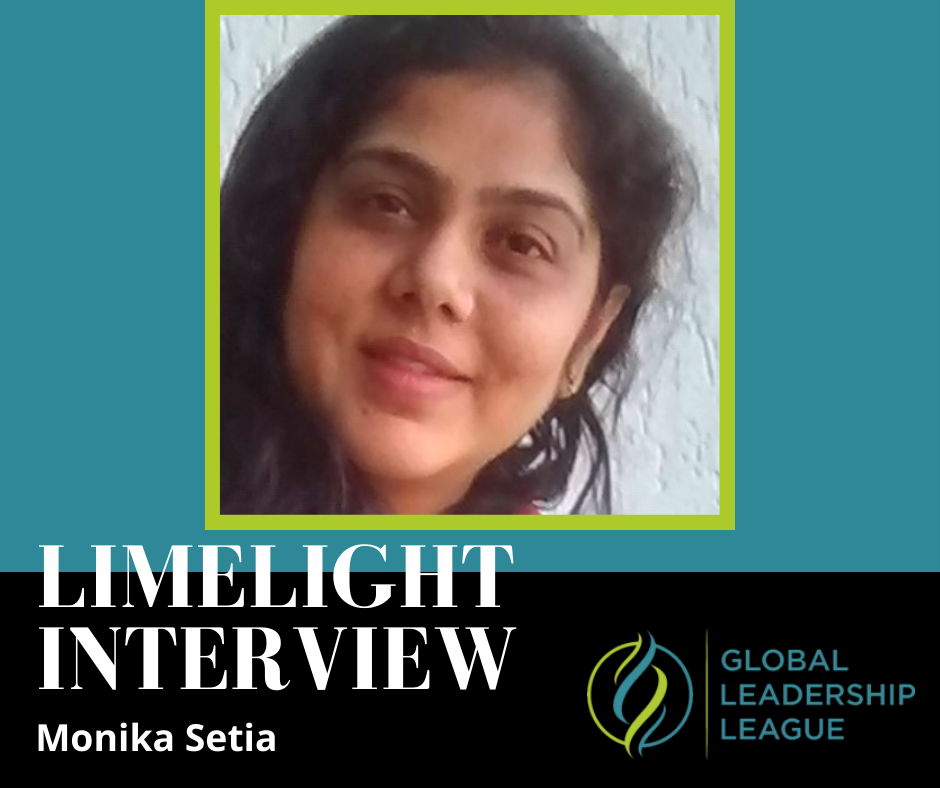
LIMELIGHT INTERVIEW WITH MONIKA SETIA
Dr. Monika Setia is working as Regional Officer – Hyderabad with the United States - India Education Foundation (USIEF) – the Fulbright Commission in India - where she manages two U.S. State Department programs - Fulbright and EducationUSA. She has a work experience of more than 15 years in the education industry. After finishing her Ph.D. degree from The Pennsylvania State University in United States, Monika completed her postdoctoral fellowship from the Duke-NUS Graduate Medical School, Singapore and then worked as an Assistant Professor with Public Health Foundation of India (PHFI) for five years. Monika has published her research in international journals, worked with both state and national ministries of health in India and international agencies on various projects, and offered multiple training programs for students and professionals.
Monika has strong passion for educational exchanges and career development of individuals. She believes that exposure to high quality education, research, and professional systems along with right mentoring and guidance on choice of suitable education and career pathways are essential for personal, academic, career, and leadership development of individuals. Having pursued her Ph.D. degree from the United States and having studied and worked in the Indian education system, she is interested in utilizing her experience and skills to promote educational and scholarly exchange between India and the United States.
Monika Setia has worked as the Regional Office at USIEF - the United States-India Educational Foundation (also the Fulbright Commission in India) for nearly four years. Her role includes managing two U. S. Department of State programs - Fulbright and EducationUSA. Monika is responsible for promoting study and academic exchanges across India and the United States through these two programs. She does this from the USIEF regional office based at the U.S. Consulate General in Hyderabad.
USIEF is essentially a bilateral organization that promotes and manages programs strengthening linkages between Indian and American institutions and this is done through different programs supported by both Indian and American governments. There is an inherent element of U.S. and Indian diplomacy and furthering the relationships between the two countries in Monika’s work. Through her work, Monika contributes to the promotion of joint research, collaboration, student and faculty exchange between India and the United States, and also student admissions to U.S. institutions. A component of the Fulbright program also involves facilitating higher education administrators from each country to visit and experience the higher education system institutions of the other country and sharing knowledge and best practices from their own country.
It seems like quite an important diplomatic role involving India and the United States and we were interested in finding out what a typical day looks like for Monika.
She is very much involved in strategic planning for both the Fulbright and EducationUSA programs. On a daily basis, she is also intensely involved in the student advising process through EducationUSA, speaking to students who want to pursue their higher education in the United States. On the Fulbright program, she works with both Indian and American scholars on their exchange process between India and the USA and promotes bilateral relationships between the two countries. Besides the long-term strategic management of both programs and the day to day advising, Monika also manages the administration involved in office, staff, budgeting, etc.
Normal office hours are 8:30 am when the consulate opens, but due to COVID she was working from home till very recently. We asked when the working day typically finishes, and she laughs.
"Honestly there's no end to the day – on most days, because we work closely with U.S. institutions, we are hosting sessions late into the evening."
We are curious to find out how Covid has changed her work, apart from having to work from home.
She tells us how USIEF expanded its reach during Covid to students located in many small towns and cities that USIEF was not able to reach previously. Going online gave them a wider audience, it gave them access to regions they were not able to reach before. So, she is now connecting with students and scholars who she would never have had a chance to speak with earlier.
"USIEF explored options to provide more opportunities to increase the number of students and scholars in more regions across India."
Of course, when the pandemic first hit, like everywhere, there was a scramble to reach U.S. Fulbright students and scholars in India and likewise to monitor the situation for Indian students based in the United States. She thinks back to March 2020, trying to make sure U.S. students and scholars in India were safe, were given the options and support to get back to their country, and just at a very basic level, to ensure everyone was doing well. It was a very busy time, she felt there was a great responsibility to ensure students and scholars’ safety and it was quite challenging emotionally, something that people will all relate to when we look back to 2020. Of course, Fulbright has been unable to bring U.S. scholars to India since then, and there was a lot of work involved in adapting to the pandemic situation and this continued for months and months, but essentially, the main goal at that time was to ensure people’s safety and well-being. Monika shares how as part of her work on global higher education, the first need is to ensure the safety and well-being of exchange grantees.
Her role seems to be multi-faceted, requiring various skills and expertise, and we were curious as to what she loves most about these different tasks.
Monika loves interacting with students and scholars, guiding/mentoring them, taking care of their needs - sometimes psychological, sometimes operational, depending on what stage of their study or exchange process they are at or where they are located.
We reflect on how this is the basis for her work. Although she is dealing at a high level with U.S. and Indian institutions and the State Department to further public diplomacy between the two countries, it all comes down to facilitating processes to ensure that both U.S. and Indian students/scholars experience the other country and culture at its best!
On a parting note, we ask her to look into her crystal ball and think about what the future might hold for U.S. and Indian collaborations in higher education.
Monika foresees change in future, with likely more internationalization happening across the educational institutions - more overseas branch campuses coming to India, more joint programs between institutions in India and abroad, and many more opportunities for academic collaborations.
We have no doubt that at the centre of this change and advancing India-U.S. relations will be Monika Setia and her organization, and at the heart of her work, the students and scholars will always remain the most important elements!
- Interview by Global Leadership League members and volunteers, Noreen Lucey and Venkata Madhuri Gunti
 The mission of the Global Leadership League is to ignite change across the global education field by empowering, connecting, and training leaders. We invite you to reach out to us here or learn more about becoming a member.
The mission of the Global Leadership League is to ignite change across the global education field by empowering, connecting, and training leaders. We invite you to reach out to us here or learn more about becoming a member.
